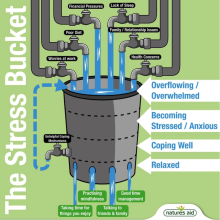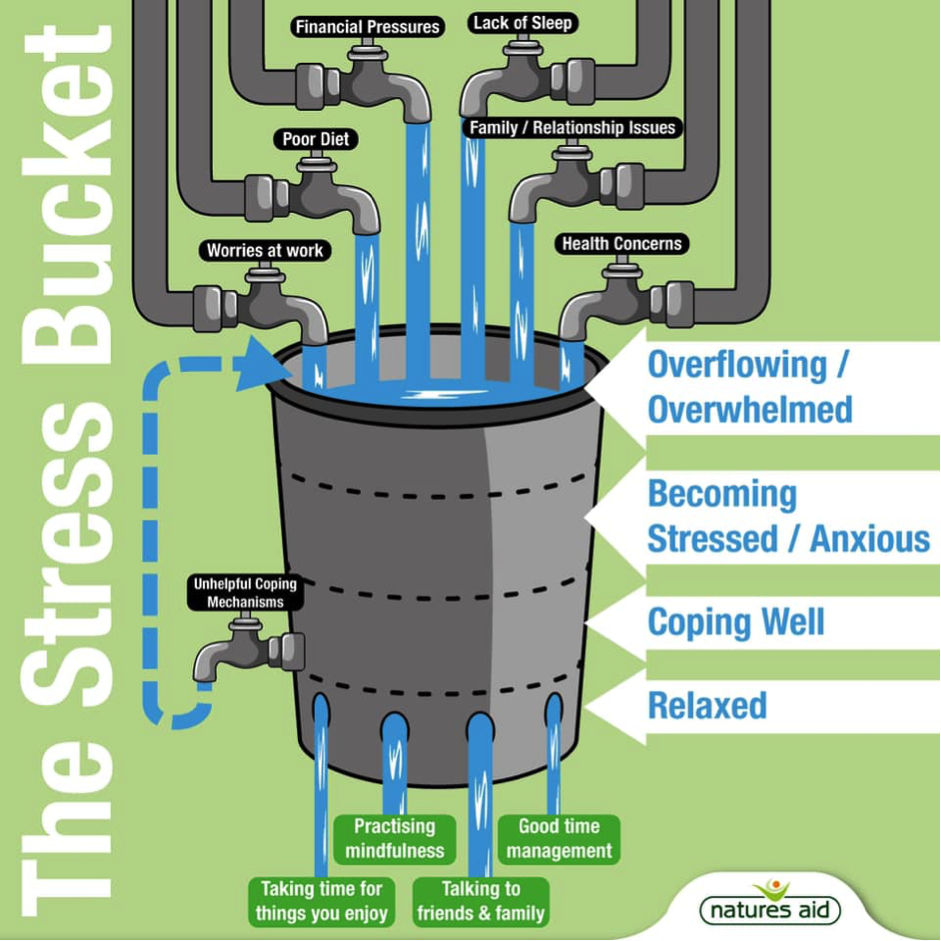
#ChildrensMentalHealthWeek2021
Most of us think of stress as something to avoid. Being stressed is bad while the opposite, being super relaxed and laid-back is good, right? Well actually, it’s not quite that simple. In fact, stress is a natural part of life and we all need it. Without stress nothing would get done. You wouldn’t be on time for your lessons, you wouldn’t meet those homework deadlines, and you might not even get out of bed in the morning. Feeling a little bit stressed means that we can engage positively with the world and do all the things we need to do. But too much stress in our lives can be problematic, impacting negatively on our physical and mental health and wellbeing and perhaps making us feel anxious, depressed or just downright miserable.
Of course, right now during lockdown it’s hardly surprising that many of us are more stressed, worried and anxious than normal. So as we begin mental health week, now is the perfect time to think about your own levels of stress and what you can do to make sure the stress in your life is manageable and that things are not getting on top of you.
To do this, try taking the stress bucket challenge.
Have a look at the stress bucket picture and imagine that all the stress in your life is water pouring into a bucket. As long as the bucket doesn’t become too full, all is well. But if the bucket begins to fill up we become more and more anxious until the bucket overflows and we become overwhelmed. Fortunately, for most of us, this doesn’t happen too often because the bucket has a tap at the bottom so if the tap is open then the water or stress can drain away.
Everyone has a different sized bucket which relates to our tolerance of stress. If you are the anxious, worrying type it probably means that your bucket is small and there is more chance that your bucket will overflow. If you’re super chilled on the other hand and nothing seems to stress you out then it’s likely that you have a big bucket that never gets full. You can’t really do much about the size of your bucket. This is really a combination of your genes, personality and life experiences. But what you can control is water flowing into the bucket and then out via the tap.
So the first part of the stress bucket challenge is to think about all the stress in your life that’s flowing into your bucket. This could be from your school work, friendships, home life or anything else that makes you worried or anxious. It might be a good idea to write them down. Is there anything here that you can change so that less stress flows into your bucket? As an example, you could talk to your teachers to help find ways to prioritise or reduce your workload or just help you manage a bit better. Perhaps you could try talking to your parents to see if they can take some of the pressure off you. But there will always be some things that you simply can’t change and so you will just have to accept that these stressors will continue to flow into your bucket.
But there is something else we can do. Remember the tap? Even if we do have to put up with stress flowing into our bucket, as long as the tap is open we can let the stress out and the bucket will not overflow.
So how do we open the tap to let the stress out?
Well the tap represents all the coping strategies we have to de-stress. Examples are getting some exercise, doing something to help you relax such as listening to music or watching a film or socialising with your friends. Two of the most effective things we can all do to open the tap and let the stress drain away are making sure we get enough sleep and talking to someone about how we are feeling. The last one is really important because we know that withdrawing from family and friends and trying to cope on our own makes things worse and then it’s more likely that your bucket will overflow.
As well as these positive coping strategies we sometimes feel so stressed that we resort to unhelpful or negative coping strategies. These might include overreacting, shouting at someone, throwing something or just procrastinating and burying our heads in the sand when we know we have to do something that we don’t want to do. Other people go further with unhelpful coping strategies such as resorting to alcohol, drugs or self-harming. The problem with unhelpful strategies is that the water flows out of a different tap. We may get temporary relief but this tap leads to the water going straight back into the bucket so the level of stress doesn’t end up any lower overall.
Once you have considered the stress flowing into your bucket, think about the coping strategies that you typically use to let the stress out of the bucket, both the helpful and unhelpful ones. Again, it might help to write them down. If you have more unhelpful coping strategies than helpful then that’s a sign that you are having a hard time managing your stress. In this case you really should talk to someone about how you are feeling. This could be your Form Tutor or your Head of Year or Assistant Head of Year or someone at home.
Right now, lots of people’s buckets are full or even overflowing but there is always something you can do to slow down the water going in and speed up the water going out.
Above all, remember there is always someone who can help you to manage your stress bucket.
Nick Forsyth
Head of Wellbeing




.png&command_2=resize&height_2=85)








.png&command_2=resize&height_2=85)
.png&command_2=resize&height_2=85)



.png&command_2=resize&height_2=85)





